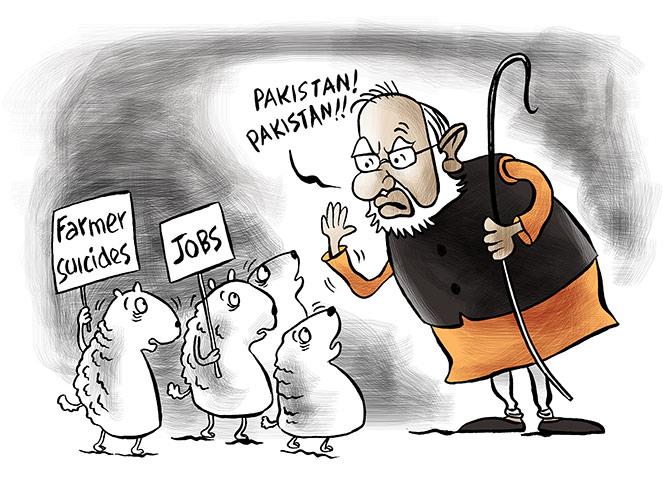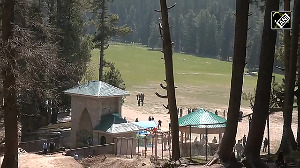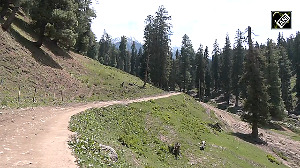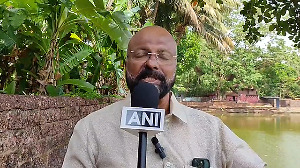'India serves itself poorly with its latter-day discovery of Pakistan as an instrument in domestic politics,' notes Shekhar Gupta.

How do we define a 'national security State'? Check out for ideas from the one living next door to us: Pakistan.
Everything about Pakistan is built around the idea of national security, or insecurity.
That is why its army has such a permanently privileged position in its power structure, and its intelligence agency, the Inter-Services Intelligence, has more institutional autonomy than any in the history of a nuclear weapons power.
How do you delude your people, 210 million or so, permanently into paying for this folly? By finding a demon ugly and dangerous enough to scare them.
To justify a national security State, you first need to build fear.
The Pakistani establishment has successfully painted India as that fearsome ogre.
That is why it is able to spend so much money on the military.
That is why that the notice prominently hanging above the head of the immigration officer stamping your passport at the Wagah border reads: 'We respect all. We suspect all.'
It follows that a national security State is also a suspicious State.
And further that is the reason why it ends up in such a mess.
A bankrupted, beg-borrowed economy, a broken society, falling social indicators, garage sale of national assets, and wide swathes of territory to a neighbourhood 'uncle' as protection fees, and the globally acknowledged distinctions like 'University of Jihad' and the 'global migraine'.
The clearest and the most useful lesson Pakistan holds out to the rest of the world, especially its neighbours, is: Don't be like me.
In India, it is evident now, we have decided not to take that warning seriously.
We are, on the other hand, caught in this new, post-2015 Pakistan obsession.
By 2014, Pakistan had nearly vanished from our public discourse.
India had broken laps ahead in the race.
Pakistan was at worst a nuisance State.
This has changed over the past five years.
Pakistan buzzed repeatedly in the Parliament debate on the Citizenship (Amendment) Bill and in the Jharkhand election campaign.
Amit Shah asked why, whether it was the surgical strike, Balakot air strike, or the CAB, the Congress party's view was the same as that of Pakistan.
Narendra Modi reflected similar sentiment in his campaign speeches.
India's self-inflicted and conscious re-hyphenation with Pakistan, for domestic politics, is now quite clear.
With Pulwama as the backdrop, the 2019 campaign was built on the theme of whether you are with us or Pakistan.
An analysis of Mr Modi's speeches in just four states -- Uttar Pradesh, West Bengal, Bihar, and Maharashtra -- by India Today's data team showed Pakistan featured 90 times.
This continued in the Haryana and Maharashtra campaigns.
Pakistan is now featuring in our discourse and lives more prominently than it has since, we'd suspect, Op Parakram 18 years ago.
Now the entire CAB rationale and debate was based on Pakistan and Partition and the treatment of minorities there.
It followed therefore that India had a special responsibility to look after the non-Muslim minorities of Pakistan, just as an Islamic State might have seen itself as a natural home for Muslims.
This was the clearest statement yet that India too had begun to see itself primarily as the natural home of Hindus, Sikhs, and other non-Muslims of the subcontinent just as Pakistan sees itself for the Muslims.
Never mind that the same Pakistan has been so bloody-minded with the so-called 'Biharis', the Urdu-speakers left behind in Bangladesh.
Some of the recent discourse harks back to much that you hear in Pakistan -- full of insecurity, hostility and bile about India.
To set the political clock back to Partition, with the promise to correct its wrongs when India has left its most hostile neighbour so far behind that it could afford to mostly forget it, amounts to a new discovery of Pakistan.
The gap between India and Pakistan has now widened so much that nobody in the world, not even China, mentions both countries in the same breath.
That hyphenation has been buried.
Just that we have now dug it out again.
Because, how do you build a national security State unless you invent insecurity first.
For this you need a fearsome enemy.
That's Pakistan.
And while by itself it may not still be scary enough, seen with the larger threat of pan-Islamism it becomes a monster.
That it brings a pall of suspicion, almost a Fifth Column image for India's own 200 million Muslims, is seen as mere collateral damage.
Let's review the tale of two countries that began new histories in 1947.
They chose contrary paths.
One became a liberal, Constitutional republic, the other a majoritarian, ideological, militaristic State.
One stayed non-aligned, the other joined the period's 'hottest' military alliances.
In less than 25 years, the ideological state had lost more than half of itself and a third country came into being.
Soon, even the new country fell back on the model of the sibling it had left behind, choosing Islam as its majoritarian ideology and military rulers.
Two decades of this beggared and impoverished it, and made it the metaphor for so many Third World ills, from epidemics to over-population to endemic poverty.
The outrageously irreverential but sharp American writer P J O'Rourke chose Bangladesh to talk about overpopulation in his collection 'All the Trouble in the World' and wrote a line as offensive, but probably factual then, as: 'How can a country not have enough to eat and still smell so much of crap?'
Soon enough, and in good time that new country went back to its founder's secular and modern ideal, much like India's.
Another two decades and now it is way ahead of Pakistan on almost every socio-economic indicator.
In many it is now leaving behind India, which helped liberate it exactly 48 years ago as this column is being written.
A country held out by Mr O'Rourke as an exemplifier of starvation and open defecation now has buried both the curses.
It's mostly open defecation-free.
Its population growth rate has declined dramatically, to the same level as India's: 1 per cent per year.
It is the fruit of dumping the ideological virus it had briefly contracted from Pakistan.
Meanwhile, the dismembered Pakistan realised it had a great natural asset -- its geography -- as the Soviets invaded Afghanistan and the Cold War shifted next door.
It benefited from it militarily and collected huge largesse in economic aid, but chose in around 1981 to employ the same Afghan tactics against India.
The results?
In 1985 on my first visit to Pakistan I was taken aback by how much better it looked.
Sure enough, its per capita income was 65% higher than India's.
In 2019, India's will be 60% higher instead.
How did that happen? Its socio-economic indicators are shot, a 13th IMF bailout has been consumed, the population growth rate is exactly twice that of India and Bangladesh.
But it still has the military, a bustling national security State where the prime minister does salaam to his army chief.
The only area where it is ahead of India is probably the number of nukes.
But, as the late K Subrahmanyam, doyen of Indian strategic studies, used to say: Why do you need more when less is enough?
India serves itself poorly with its latter-day discovery of Pakistan as an instrument in domestic politics.
For comparisons with Pakistan now, India will need to stoop so low that our knees would hurt.
The other way, God forbid, is if we let their experiments with building an ideological, national security State inspire us to remould India of the future in a similar sectarian image.
That is an avoidable tragedy.
In special arrangement with The Print
Shekhar Gupta is the editor, The Print.













 © 2025
© 2025